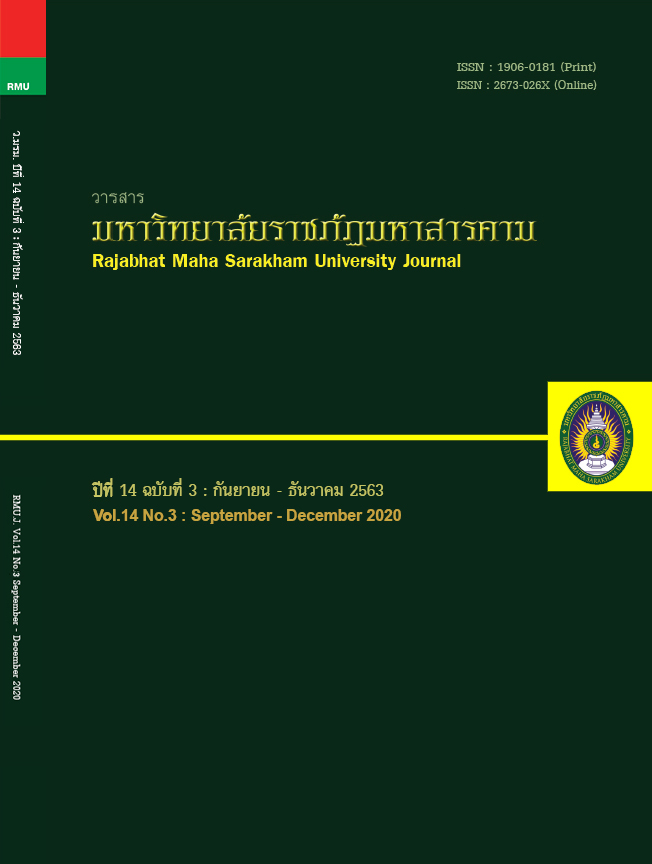โมเดลการวัดความเป็นพลเมืองโลกของนักเรียนระดับชั้นมัธยมศึกษาตอนปลาย
Main Article Content
บทคัดย่อ
การวิจัยครั้งนี้มีวัตถุประสงค์เพื่อพัฒนาและตรวจสอบความตรงของโมเดลการวัดความเป็นพลเมืองโลกของนักเรียนระดับชั้นมัธยมศึกษาตอนปลาย จำนวน 2,286 คน (ชาย 34.21% และหญิง 65.79%) จาก 30 โรงเรียน ได้จากการสุ่มแบบแบ่งชั้น (Stratify Random Sampling) เครื่องมือวิจัยคือแบบสอบถามความเป็นพลเมืองโลก แบบมาตรประมาณค่า 5 ระดับ จำนวน 55 ข้อ ค่าความเชื่อมั่นทั้งฉบับ (Reliability) เท่ากับ 0.968 วิเคราะห์ข้อมูลด้วยสถิติเชิงบรรยายและการวิเคราะห์องค์ประกอบเชิงยืนยันอันดับสอง (Second Order Factor Analysis) ด้วยโปรแกรม Mplus7.40
ผลการวิเคราะห์พบว่า โมเดลการวัดความเป็นพลเมืองโลกของนักเรียนระดับชั้นมัธยมศึกษาปลายมีความตรงทางการวัดในระดับดี ประกอบด้วยองค์ประกอบ 5 ด้าน จาก 16 ตัวบ่งชี้ ด้านที่มีน้ำหนักองค์ประกอบ (Factor Loading) สูงสุดคือ ความรับผิดชอบในหน้าที่ของตนเอง (4 ตัวบ่งชี้) ความเป็นธรรมในสังคม (3 ตัวบ่งชี้) การช่วยเหลือระหว่างกลุ่ม (2 ตัวบ่งชี้) คุณค่าของความหลากหลายชาติพันธุ์ (4 ตัวบ่งชี้) การเห็นอกเห็นใจระหว่างกลุ่ม (3 ตัวบ่งชี้) ตามลำดับ
Article Details
1. บทความที่ลงตีพิมพ์ทุกเรื่องได้รับการตรวจทางวิชาการโดยผู้ประเมินอิสระ ผู้ทรงคุณวุฒิ (Peer Review) สาขาที่เกี่ยวข้อง อย่างน้อย 3 ท่าน ในรูปแบบ Double blind review
2. ข้อคิดเห็นใด ๆ ของบทความที่ลงตีพิมพ์ในวารสารมหาวิทยาลัยราชภัฏมหาสารคาม นี้เป็นของผู้เขียน คณะผู้จัดทำวารสารไม่จำเป็นต้องเห็นด้วย
3. กองบรรณาธิการวารสารมหาวิทยาลัยราชภัฏมหาสารคาม ไม่สงวนสิทธิ์การคัดลอกแต่ให้อ้างอิงแสดงที่มา
เอกสารอ้างอิง
พรรณทิพย์ ศิริวรรณบุศย์ (2553). มนุษยสัมพันธ์.สำนักพิมพ์แห่งจุฬาลงกรณ์มหาวิทยาลัย
Byrne, B. M. (2012). Structural Equation Modeling with Mplus: Basic Concepts, Applications, and Programming. NY: Routledge.
Damrongpanit, S. (2019a). Factor Affecting Self-discipline as Good citizen for the Undergraduates of Chiang Mai University in Thailand: A multilevel Path Analysis. Journal of Educational Research, 7(2), 347-355.
Damrongpanit, S. (2019b). How to Measure Self-discipline as Good Citizen for the Undergraduates. Journal of Educational Research, 7(5),1180-1188.
Eisenberg, N., Lennon, R., & Roth, K. (1983).Prosocial development: A longitudinal study. Developmental Psychology, 19: 846-855.
Kelloway, E. K. (2015). Using Mplus for Structural Equation Modeling: A Researcher’s Guide (2nd ed.). CA: Sage.
Le Bourdon, M. (2018). Informal Spaces in Global Citizenship Education, Policy & Practice: A Development Education Review, 26, 105-121.
Reysen, S., & Miller, K., I. (2013). A model of global citizenship: Antecedents and outcomes. International Journal of Psychology, 48(5), 858-870.
Sklarwitz, S. (2017).Assessing global citizenship attitudes with Q methodology. The journal of social research, 41, 171-182.
Rothstein, R. (2000). Towards a composite index of school performance. The Elementary School Teacher, 100(5), 409-441.


